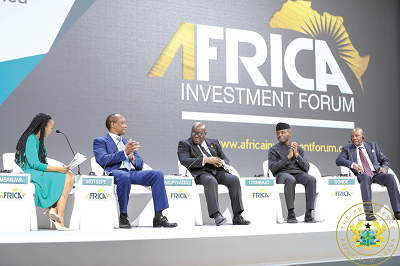
Government’s focus is to facilitate private sector growth — Akufo-Addo
President Nana Addo Dankwa Akufo-Addo has reiterated the government’s commitment to create an enabling environment for the private sector to thrive.
He maintained that the role of the government was to be a facilitator for the development of the private sector, stressing that had been the focus of his government.
Speaking as a panellist on: “Championing Investments: Presidential investment chats”, at the ongoing Africa Investment Forum in Johannesburg, South Africa, President Akufo-Addo stated that the government did not consider itself as a competitor to the private sector, nor did it intend to substitute itself for the private sector in the growth and development of the country.
The forum is being organised by the African Development Bank.
President Akufo-Addo explained that one of the reasons for the modest successes chalked up by the government, such as the growth of the economic rate from 3.6 per cent in 2016 to 8.5 per cent in 2017, was the provision of incentives for the private sector to thrive.
Tax reduction
Some of the policies introduced by the government, he said, included a raft of tax cuts, the abolition of nuisance taxes and a reduction in utility tariffs which, for example, had seen electricity tariffs for businesses reduced by as much as 30 per cent and water tariffs also reduced by 10 per cent.
The President added that his administration had established a clear perception about the rule of law in Ghana, stressing that “the rule of law is working not just for Ghanaians but also for foreigners who decide to invest in our economy”.
He said a third area of focus for his government had been the promotion of policies that were stimulating industrial and agricultural activities.
Strategic industries
On industry, President Akufo-Addo said the government was developing strategic industries out of the country’s abundant natural resources of bauxite and iron ore and had established an Integrated Bauxite/Aluminium Development Authority to assemble the financial resources for the full exploitation and development of Ghana’s large bauxite deposits.
Ghana Beyond Aid
He said the government was keen on improving the capacity of the state to manage the country and its economy and that the phenomenon whereby only some six per cent of the population paid taxes did not inure to the benefit of the people.
Accordingly, the President said, the government was initiating policies to broaden the tax net, explaining that “we believe we are capable of financing our own development out of our own resources”.
Corruption
Talking about corruption, President Akufo-Addo said independent institutions had thoroughly investigated all allegations of corruption levelled against appointees in his administration.
“So far, investigations have not yielded any evidence (of appointees indulging in corruption), but it is important that it is known that people in my administration will be subject to scrutiny if they go off schedule,” he added.
Last year, allegations against the then Minister for Energy designate, Mr Boakye Agyarko, at his parliamentary confirmation hearings, were subjected to a bi-partisan probe in Parliament which ended up exonerating him.
Again, allegations made against the then CEO of BOST, Mr Alfred Obeng; the two deputy chiefs of Staff, the then Deputy Minister of Youth and Sports, Mr Pius Enam Hadzide, and the Board Chairman of the National Sports Authority, Mr Kwadwo Baah, were investigated by the Criminal Investigations Department (CID) of the Ghana Police.
Additionally, claims of extortion against the Trade Minister, Mr Alan Kyerematen, were investigated by a bi-partisan committee of Parliament, which exonerated him.
President Akufo-Addo indicated that “they have all been investigated and no evidence had been adduced to suggest mildly the perpetration of any act of corruption”.
Agriculture
President Akufo-Addo said beneficiary farmers under the government’s flagship programme, Planting for Food and Jobs, had increased from 200,000 to 500,000.
That, he said, had culminated in the dramatic increase in productivity and the output of farmers, resulting in a greater output of foodstuffs not witnessed in the country in recent years.
He said in the first year of the programme, the government supported some 200,000 small-holder farmers with inputs such as fertilizer, access to extension services, improved seedlings and a marketing platform.
“That is the connection that we are trying to make to see how we can bring whatever authority the government has to support these initiatives with appropriate policy. Our goal is that within four years a million farmers will be on this programme,” he added.
